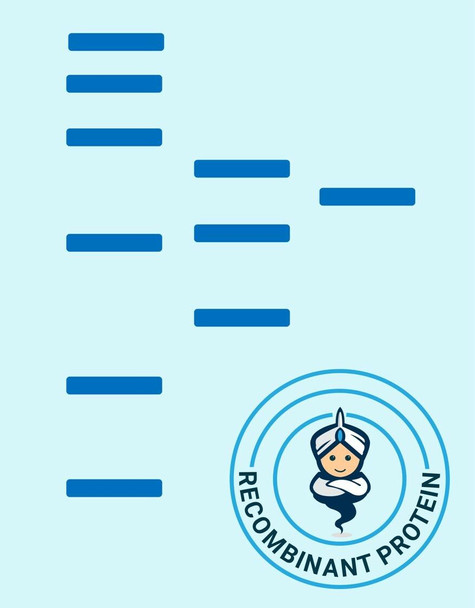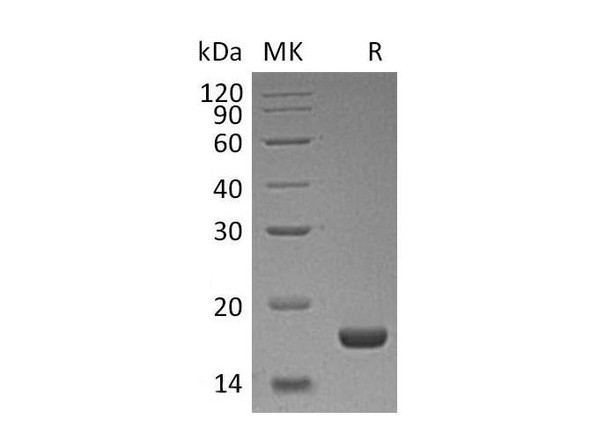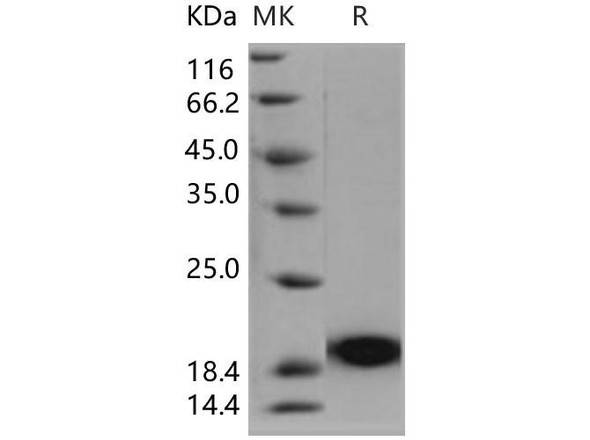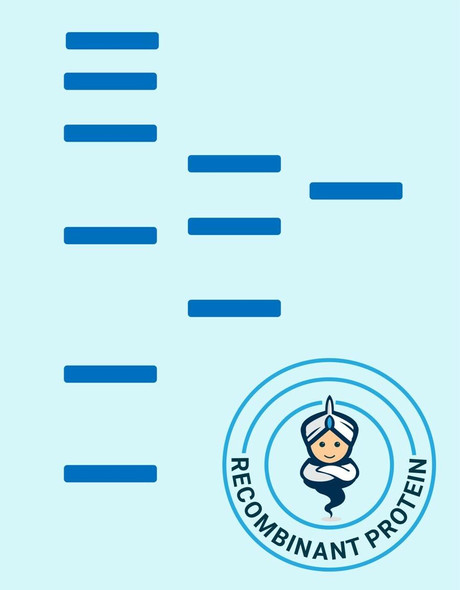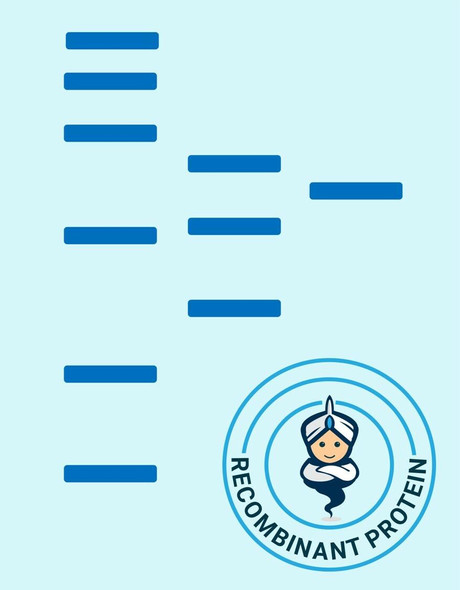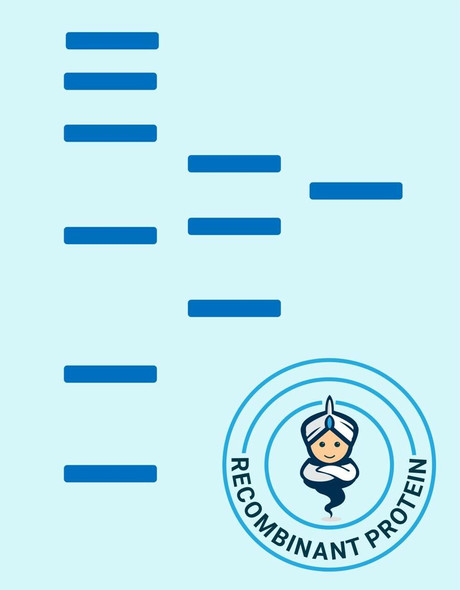Description
| Product Name: | Human PLA2G1B Recombinant Protein |
| Product Code: | RPPB2120 |
| Size: | 10µg |
| Species: | Human |
| Target: | PLA2G1B |
| Synonyms: | Phospholipase A2, EC 3.1.1.4, Phosphatidylcholine 2-acylhydrolase, Group IB phospholipase A2, PLA2, PLA2A, PPLA2, sPLA2-IB,MGC119834, MGC119835, PLA2G1B. |
| Source: | Escherichia Coli |
| Physical Appearance: | Lyophilized (freeze-dried) powder. |
| Formulation: | Filtered (0.4�m) and lyophilized from 0.5 mg/ml in 0.05M Acetate buffer pH-4. |
| Solubility: | Add 0.1M Acetate buffer pH4 to prepare a working stock solution of approximately 0.5 mg/mL and let the lyophilized pellet dissolve completely. For conversion into higher pH value, we recommend intensive dilution by relevant buffer to a concentration of 10?g/ml. In higher concentrations the solubility of this antigen is limited. Product is not sterile! Please filter the product by an appropriate sterile filter before using it in the cell culture. |
| Stability: | Store lyophilized protein at -20°C. Aliquot the product after reconstitution to avoid repeated freezing/thawing cycles. Reconstituted protein can be stored at 4°C for a limited period of time; it does not show any change after two weeks at 4°C. |
| Purity: | Greater than 95% as determined by SDS-PAGE. |
| Amino Acid Sequence: | MRGSHHHHHH GMASHMAVWQFRKMIKCVIP GSDPFLEYNN YGCYCGLGGS GTPVDELDKC CQTHDNCYDQ AKKLDSCKFL LDNPYTHTYSYSCSGSAITC SSKNKECEAF ICNCDRNAAI CFSKAPYNKA HKNLDTKKYC QS |
Group IB secretory phospholipase A2 (sPLA2-IB) mediates cell proliferation, cell migration, hormone release and eicosanoid production via its receptor in peripheral tissues. In the CNS, high-affinity binding sites of sPLA2-IB have been documented. sPLA2-IB induced neuronal cell death in a concentrationdependent manner depending on PGD2 metabolites, especially Delta12-PGJ2 that might mediate sPLA2-IB-induced apoptosis. The secretory PLA2 (sPLA2) family, in which 10 isozymes have been identified, consists of lowmolecular weight, Ca2+-requiring secretory enzymes that have been implicated in a number of biological processes, such as modification of eicosanoid generation, inflammation, and host defense.
Secreted Phospholipase A2-IB Human Recombinant is manufactured with N-terminal fusionf HisTag. PLA2G1B His-Tagged Fusion Protein is 16 kDa containing 126 amino acid residues of the human secreted phospholipase A2-IB and 16 additional amino acid residues - HisTag (underlined).
| UniProt Protein Function: | PLA2G1B: PA2 catalyzes the calcium-dependent hydrolysis of the 2- acyl groups in 3-sn-phosphoglycerides. Belongs to the phospholipase A2 family. |
| UniProt Protein Details: | Protein type:Lipid Metabolism - arachidonic acid; Secreted, signal peptide; Secreted; Lipid Metabolism - glycerophospholipid; Lipid Metabolism - ether lipid; Phospholipase; Lipid Metabolism - alpha-linolenic acid; EC 3.1.1.4; DNA replication; Lipid Metabolism - linoleic acid Chromosomal Location of Human Ortholog: 12q24.31 Cellular Component: extracellular space; cell surface; extracellular region; secretory granule Molecular Function:phospholipase A2 activity; calcium-dependent phospholipase A2 activity; bile acid binding; calcium ion binding; receptor binding Biological Process: positive regulation of immune response; activation of MAPK activity; neutrophil mediated immunity; activation of phospholipase A2; glucose transport; signal transduction; activation of NF-kappaB transcription factor; phosphatidylcholine metabolic process; positive regulation of fibroblast proliferation; phospholipid metabolic process; fatty acid biosynthetic process; neutrophil chemotaxis; multicellular organismal lipid catabolic process; glycerophospholipid biosynthetic process; actin filament organization; arachidonic acid secretion; leukotriene biosynthetic process; defense response to Gram-positive bacterium; cellular response to insulin stimulus; innate immune response in mucosa; positive regulation of protein secretion; antibacterial humoral response; phosphatidic acid biosynthetic process; positive regulation of transcription from RNA polymerase II promoter; interleukin-8 production; positive regulation of DNA replication |
| NCBI Summary: | This gene encodes a secreted member of the phospholipase A2 (PLA2) class of enzymes, which is produced by the pancreatic acinar cells. The encoded calcium-dependent enzyme catalyzes the hydrolysis of the sn-2 position of membrane glycerophospholipids to release arachidonic acid (AA) and lysophospholipids. AA is subsequently converted by downstream metabolic enzymes to several bioactive lipophilic compounds (eicosanoids), including prostaglandins (PGs) and leukotrienes (LTs). The enzyme may be involved in several physiological processes including cell contraction, cell proliferation and pathological response. [provided by RefSeq, Aug 2013] |
| UniProt Code: | P04054 |
| NCBI GenInfo Identifier: | 4505847 |
| NCBI Gene ID: | 5319 |
| NCBI Accession: | NP_000919.1 |
| UniProt Secondary Accession: | P04054,Q3KPI1, B2R4H5, |
| UniProt Related Accession: | P04054 |
| Molecular Weight: | 16,360 Da |
| NCBI Full Name: | phospholipase A2 |
| NCBI Synonym Full Names: | phospholipase A2, group IB (pancreas) |
| NCBI Official Symbol: | PLA2G1B�� |
| NCBI Official Synonym Symbols: | PLA2; PLA2A; PPLA2�� |
| NCBI Protein Information: | phospholipase A2; phosphatidylcholine 2-acylhydrolase 1B |
| UniProt Protein Name: | Phospholipase A2 |
| UniProt Synonym Protein Names: | Group IB phospholipase A2; Phosphatidylcholine 2-acylhydrolase 1B |
| Protein Family: | Phospholipase |
| UniProt Gene Name: | PLA2G1B�� |
| UniProt Entry Name: | PA21B_HUMAN |

